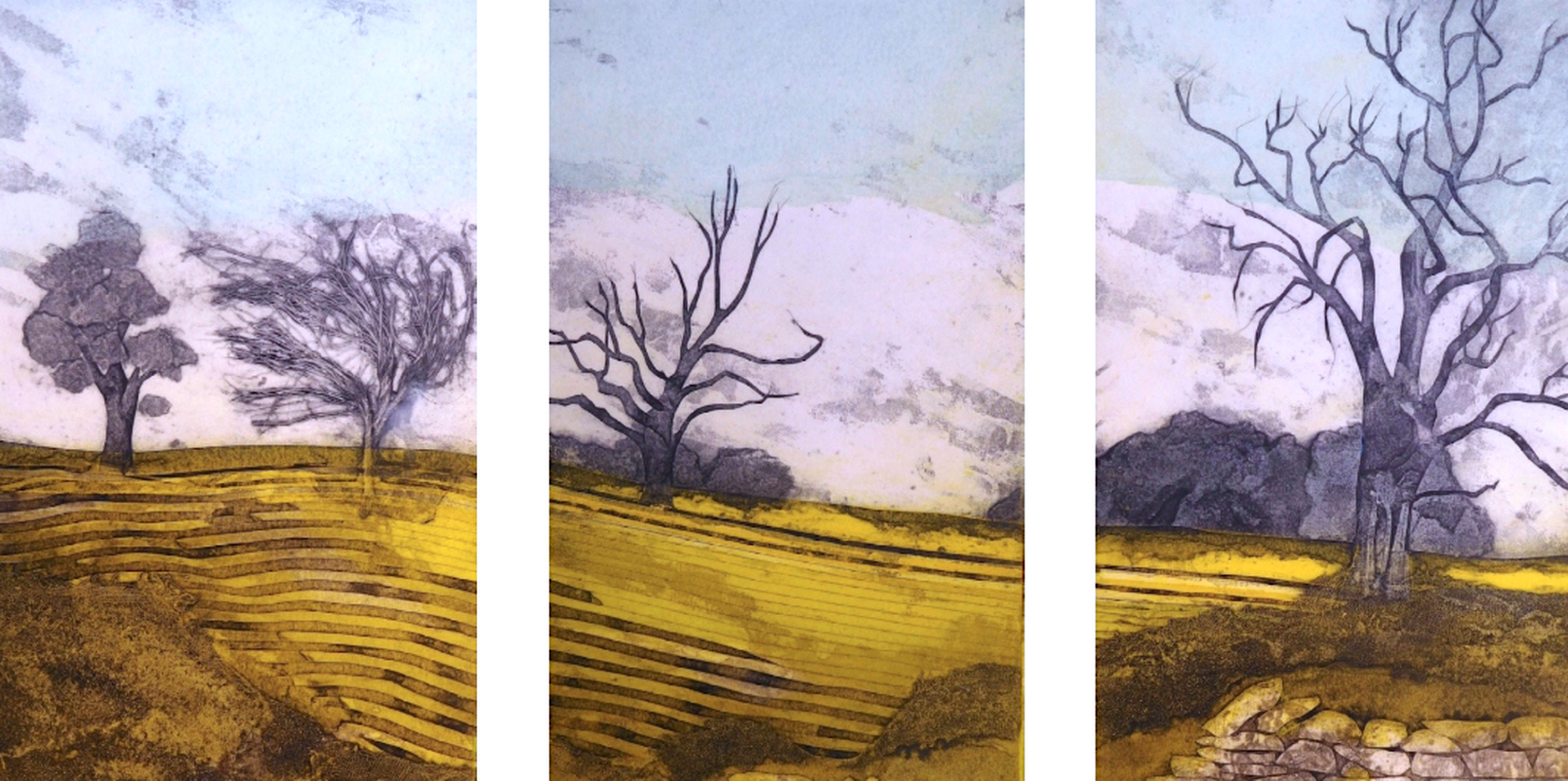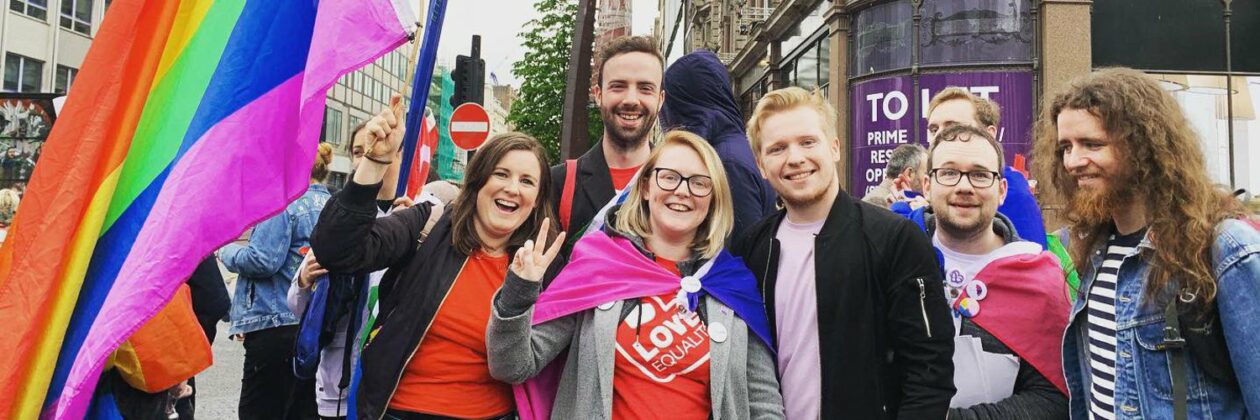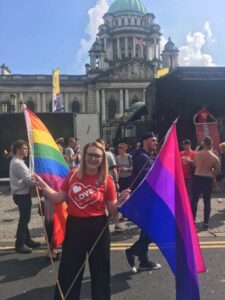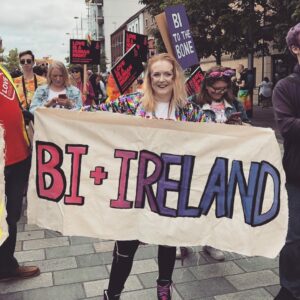
SARAH ROSS-THOMPSON AND THE ART OF COLLAGRAPHED PRINTS
I interviewed artist Sarah Ross-Thompson whose exceptional Collagraphed prints use fabrics, lichen, porridge and string to create images of the dramatic Scottish Highlands where she

I interviewed Hannah McNamara, LGBTQ+ campaigner and Green activist, about growing up as bisexual in Northern Ireland, coming out, winning a diversity award at work, and coping with major physical conditions during a pandemic.
Leslie: Can you tell us about your Rising Star in Diversity award please? What did you win it for, how has it affected you and what new experiences has it led to?
Hannah: I was nominated for my Rising Star award by a work colleague for what I’d done as the Co-Chair of my company’s Pride Network and for being a visible role model as a bisexual woman in the technology industry and within local politics. The award recognises women across a vast range of industries, with the Diversity award in particular recognising women who have made contributions in diversity and inclusivity within their job role or community.
The award was very well received and celebrated within my workplace and enabled me to bring more visibility and support for LGBTQ+ issues in my workplace. My friends and family were very excited and proud, it is just a shame that I won it during lockdown and was unable to celebrate in person with my colleagues or my family and friends!
Leslie: As a self-identified bisexual, what have been the key incidents that helped you to recognise who you are? What are the common misconceptions and barriers you’ve had to overcome?
Hannah: Growing up I always felt different to my peers but was not always able to identify why. I usually felt like an outsider or the “weird” one In the group. When I went to secondary school in 2005, the internet was quickly becoming a space where you could find a place for yourself. I learnt about the word bisexual and what it meant when I was 11 and instantly knew that described how I felt. I began to come out at school but of course this was not well received by my peers and I was often bullied. I decided it was a phase and didn’t really talk much about it for many years after that.
After I finished school and went to a further education college, I was involved in student politics. The campaign for marriage equality in Northern Ireland was just beginning and I found myself questioning my identity again and if I really was just a good ally or I was actually bisexual. The common misconceptions and barriers are always thrown back in your face and are present both in the straight community and LGBTQ+ community. Bisexuals are greedy, untrustworthy, attention seeking, confused, can’t pick a side, I could go on!!
When I went to university, it still took me several years to come to terms with it all, but in my final year, I confided in my friendship group and they were all very supportive. I ended up searching for and finding a local bisexual support group called Bi+ Ireland and went to my first meeting and the people I met there in 2018, are still my closest friends today. It was this group that really began to change my life. Here I met my partner, my closest friends and found my true community. They gave me the confidence to come out to my family and even publicly, as I ran for election to my local council, in a speech in Northern Ireland’s Parliament Buildings at Stormont.
Leslie: What are the official and unofficial attitudes to LGBTQ+ rights in N. Ireland? How and why are they changing?

Hannah: For the last 10 years, attitudes towards LGBTQ+ people in NI in general have been improving, with more acceptance being gained with the eventual passing of marriage equality legislation – but those rights were hard fought. However, we still do not have a sexual orientation strategy within schools, there are still issues with homophobic, biphobic and transphobic bullying. The Gender Identity clinic has taken no new patients since 2017 and there seems to be no movement within the government to have more funding or support for trans and non-binary people transitioning. Without government support, it is left to charities to pick up the pieces and offer lifesaving services.
And while attitudes are changing, there is still less known about bi, trans and non-binary people, especially with transphobia being rife in the UK media for the past several years.
Leslie: You describe yourself as ‘chronically ill’. Would you like to tell us more about your conditions and how you deal with them?
Hannah: I have asthma, endometriosis and idiopathic intercranial hypertension.
Endometriosis is a condition where tissue similar to that of the lining of the uterus, grows elsewhere in the body. It affects 1 in 10 people, mainly cis women and trans men and some non-binary people, but has also been found in cis men and other genders too. Endometriosis lesions have been found in every single organ of the body, and is not just a “bad period”. It is incurable and is classed as one of the NHS’ most painful conditions. Some symptoms can include pelvic pain that may worsen during menstruation, painful sex, heavy bleeding, painful bowel movements or urination and infertility. It is often misdiagnosed and can take up to 7 years to diagnose. It is diagnosed through surgical laparoscopy (keyhole surgery) with lesions being removed and tested. There are two types of surgical removal methods, ablation (burning) and excision (expert removal). Excision is the gold standard for endometriosis treatment and has the best effectiveness at reducing symptoms on a longer term, but unfortunately this type of surgery is not available anywhere on the island of Ireland, only in England. Hormone treatment is sometimes used however this does not actually treat the disease, it only provides relief to some symptoms such as heavy painful periods for some people.
I have always had symptoms of endometriosis, but they worsened to a point where I attended A&E first in 2016. I had my first ablation surgery in 2019 and have recently been advised that due to the return of my symptoms, I will need further excision surgery for which I will have to travel to England. At the moment my treatment is only the Mirena IUS which has reduced my heavy periods, but I get almost daily pelvic and lower back pain, ovarian cysts and pain and severe fatigue. I am not prescribed any pain medication so I have to manage the pain myself at home with ibuprofen, hot water bottles and cooling period patches. There are times where I am unable to get out of bed or do basic self care because of the pain I am in. I am waiting until the pandemic has calmed until I book my surgery. I am very privileged and lucky to be able to have access to private health insurance through my employer, otherwise I would still be on a waiting list for my first surgery.
My other main chronic condition is idiopathic intercranial hypertension. This is classed as a rare disease and affects around 1 in 100,000 people, particularly young women but has been diagnosed in all ages and genders including children. IIH is a condition where there is raised spinal fluid pressure around the brain. Its main symptoms include disabling daily headaches, visual and auditory disturbances. If left untreated, vision loss can be permanent in one or both eyes. The raised spinal fluid but pressure on the optic nerve, leading to blind spots and blurred vision, with ongoing treatment the risk to eyesight can be reduced.
I have long struggled with headaches, but I first noticed the visual disturbances and a whopping in my ear in March 2020, just after the covid-19 outbreak began in the UK. I had greyed patches in my eye that appeared infrequently but gradually became worse and more persistent as the months went on. Due to lockdown, I did not feel safe seeking help due to the high amount of covid cases so I waited until July when the numbers were low and I went to Specsavers. The optician took a photograph of the back of my eye and saw that my optic nerve was very swollen and I was sent to A&E. After a week in and out of hospital I was finally diagnosed with IIH and underwent a lumbar puncture to drain off some of the spinal fluid. After that I was treated with medication and seen jointly by neurology and a neuro-ophthalmologist. The side effects of the medications were hard on my body and increased the severity of my headaches and introduced fatigue, nausea, changes in my taste, numbing and pins and needles in my hands, feet and mouth, ringing in my ears and even hair loss. I was able to get a slow-release version of the medication for a short time that reduced a lot of the side effects, but due to Brexit and covid they are very difficult to get and are out of stock with the manufacturers.
Recent scans of my eye have shown a huge improvement and my optic nerve is no longer swollen and my eyesight is not at risk. I am to continue on the medication as the condition is chronic and because it is also idiopathic, there is no known cause or cure.
I mostly deal with my conditions by resting and better understanding any triggers for flare ups.

Leslie: Can you describe the best moments you’ve experienced with collective self-help and mutual support in the community?
Hannah: With covid, this has been very difficult as being asthmatic has also meant I am at higher risk for complications if I were to contract covid. I have been very isolated during the pandemic and this will be the same for anyone with a chronic illness or disability. The thing to also remember is that once lockdowns lift, a lot of disabled and chronically ill people will still feel isolated due to the limiting nature of their conditions and I hope that people continue to make their events accessible.
The best moments I’ve experienced is usually just validation that my pain is real, my identity is real, there are others out there that understand. There is a strong endometriosis community on Instagram and finding them and cutting through the myths of the disease enabled me to be better informed when speaking to my doctors.
I find that the LGBTQ+ community itself intersects a lot with the chronically ill and disabled community and within that group I have found a lot of support whether its online or in person.
Leslie: What have you learned about yourself and others through making common cause with the groups you work with?
Hannah: I have learnt that there are so many amazing and talented people that have given true meaning to my identity and my life. Finding the queer community changed my life and has made me a more patient, understanding and open-minded person. Finding the chronically ill community has also helped me better understand self-care, respect my own personal boundaries and limitations and how to better ask for help and support from others.
Next week I interview Martin Day who has scripted Doctors on BBC1, Family Affairs on Channel Five, Fair City (RTÉ), and was lead writer on CBBC’s Crisis Control.
ABOUT LESLIE TATE’S BOOKS:

I interviewed artist Sarah Ross-Thompson whose exceptional Collagraphed prints use fabrics, lichen, porridge and string to create images of the dramatic Scottish Highlands where she

Part 2 of my interview with Mark Statman looks closely at Mark’s Latin American poetic influences, his life in Mexico and ends with an extract

I interviewed international poet and translator Mark Statman about Volverse/Volver, his 14th published collection. Mark, who has won national arts awards, is Emeritus Professor of Literary

I interviewed Lisa Dart, finalist in the Grolier, Aesthetica and Troubadour Poetry Prizes and author of The Linguistics of Light (poems, Salt, 2008), Fathom (prose

I interviewed writer Julia Lee Barclay-Morton about her experience of autism. Julia began as an experimental dramatist in New York, moving to the UK to
| Cookie | Duration | Description |
|---|---|---|
| cookielawinfo-checkbox-analytics | 11 months | This cookie is set by GDPR Cookie Consent plugin. The cookie is used to store the user consent for the cookies in the category "Analytics". |
| cookielawinfo-checkbox-functional | 11 months | The cookie is set by GDPR cookie consent to record the user consent for the cookies in the category "Functional". |
| cookielawinfo-checkbox-necessary | 11 months | This cookie is set by GDPR Cookie Consent plugin. The cookies is used to store the user consent for the cookies in the category "Necessary". |
| cookielawinfo-checkbox-others | 11 months | This cookie is set by GDPR Cookie Consent plugin. The cookie is used to store the user consent for the cookies in the category "Other. |
| cookielawinfo-checkbox-performance | 11 months | This cookie is set by GDPR Cookie Consent plugin. The cookie is used to store the user consent for the cookies in the category "Performance". |
| viewed_cookie_policy | 11 months | The cookie is set by the GDPR Cookie Consent plugin and is used to store whether or not user has consented to the use of cookies. It does not store any personal data. |